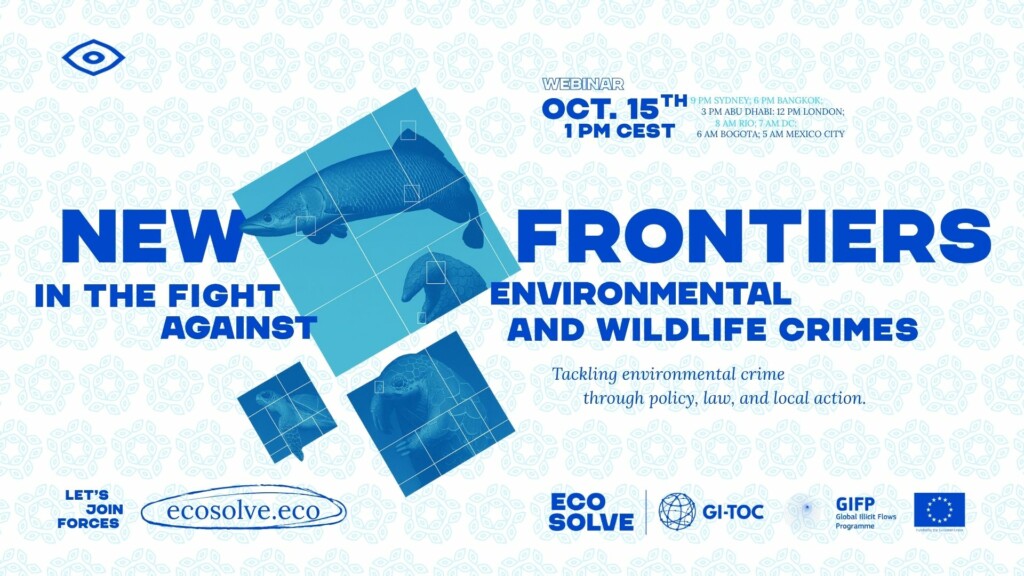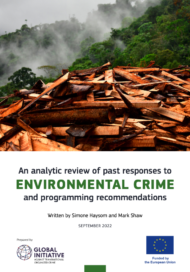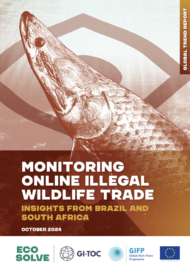Environmental crime remains one of the world’s most pressing yet under-addressed threats. From illegal waste trafficking and deforestation to transboundary pollution and biodiversity loss, these crimes often occur at the intersection of licit and illicit systems, sustained by regulatory gaps, weak enforcement, and corruption.
The ECO-SOLVE programme, led by the Global Initiative Against Transnational Organized Crime (GI-TOC) and funded by the European Union, supports the development of data-driven responses, multilateral engagement, and locally led strategies to combat environmental crime.
In October 2025, GI-TOC will convene a three-part public webinar series bringing together policymakers, legal experts, environmental defenders, and civil society actors. The series will explore global treaty negotiations, efforts to reform international legal frameworks, and community-based innovations from the Amazon, building momentum ahead of major multilateral milestones.

Key Themes Across the Series
- Reinforcing global commitments through treaty negotiations and legal reform
- Exposing enforcement gaps and corruption that enable environmental crime
- Amplifying local expertise and community-driven strategies in affected regions
- Advancing evidence-based responses through research, partnerships, and innovation
Key Objectives of the Webinar Series
- Inform: Share cutting-edge research and policy recommendations on environmental crime
- Engage: Create a dialogue between international policymakers and frontline defenders
- Amplify: Elevate the voices of civil society and local communities in global policy debates
- Coordinate: Build momentum and alignment ahead of key multilateral events like COP30 and the next rounds of UNTOC and UNEP negotiations
Target Audience
- Government and law enforcement officials
- Civil society and community-based organizations
- International organizations and UN agencies
- Academic and legal experts
- Journalists and media
- General public with interest in environmental justice
[1:00 – 1:05 PM CEST ] Opening remarks: Mark Shaw, Executive Director (GI-TOC)
[1:00 – 2:00 PM CEST ] Panel 1: A Plastic Problem – The Illegal Trade in Waste
This session examines the trafficking of plastic waste and the misuse of recycling frameworks by multinational brokers. It will unpack findings from GI-TOC’s recent research and ongoing international negotiations on plastic regulation.
- Moderator: Simone Haysom, Director of Environmental Crime (GI-TOC)
- Lauren Young, Analyst (GI-TOC)
- Christopher Hudak, Basel Action Network
- Sedat Gündoğdu, Cukurova Üniversitesi
[2:00 – 3:00 PM CEST ] Panel 2: To Be or Not to Be? A New UNTOC Protocol on Environmental Crimes
A timely panel unpacking why a new protocol to the UNTOC is being discussed, what impact it could have, and what should be prioritised to ensure it is meaningful.
Moderated Panel Discussion –Juliana Machado Ferreira, Executive Director Freeland Brasil
- John Scanlon, Chair, Global Initiative to End Wildlife Crime and former Secretary-General of CITES Reflections on a decade of efforts to promote a new protocol under UNTOC and the growing urgency for global action.
- Dyhia Belhabib, Programme Manager of Fisheries and Principal Investigator of I-Sea Fisheries, Ecotrust
- Ian Tennant, GI-TOC Findings from GI-TOC’s recent report on the 4th Protocol, including priority recommendations to the IEG for improving coherence and ambition in tackling environmental crime.
- Carlos Alberto Sanchez del Aguila, Minister Counsellor, Permanent Mission of Peru to the UN in Vienna Report back on the first IEG meeting and reflections on how the process could evolve.
[3:00 – 4:00 PM CEST ]Panel 3: From the Ground to COP30 – Local Perspectives on Environmental Crime and Climate Justice in the Brazilian Amazon
This panel will explore how grassroots strategies and community knowledge can inform global responses to environmental crime particularly in the lead-up to COP30 in Belém. Drawing on findings from the ECO-SOLVE policy brief Amplifying Community-Led Solutions to Combat Environmental Crimes in the Amazon, panellists will share lessons from the ground and examine how environmental defenders can play a more central role in shaping just, effective climate action.
- Moderator: Siria Gastelum
- Presentation of Policy Brief – Laura Avila, GI-TOC (12 min)
- Panel Discussion: Community-Based Strategies in the Amazon (30 min)
- Jamilly Brito Guimarães, MAB
- Ana Celina Bendet, CEDECA
- Claudelice Santos, Instituto Ze Claudio e Maria
El crimen ambiental sigue siendo una de las amenazas más urgentes pero menos abordadas del mundo. Desde el tráfico ilegal de residuos y la deforestación hasta la contaminación transfronteriza y la pérdida de biodiversidad, estos delitos suelen producirse en la intersección entre los sistemas lícitos e ilícitos, sostenidos por vacíos normativos, una aplicación débil de las leyes y la corrupción.
El programa ECO-SOLVE, liderado por la Iniciativa Global contra el Crimen Organizado Transnacional (GI-TOC) y financiado por la Unión Europea, apoya el desarrollo de respuestas basadas en datos, la cooperación multilateral y estrategias locales para combatir los delitos ambientales.
En octubre de 2025, GI-TOC organizará una serie pública de tres seminarios en línea que reunirán a responsables políticos, expertos jurídicos, defensores del medio ambiente y representantes de la sociedad civil. La serie explorará las negociaciones de tratados globales, los esfuerzos por reformar los marcos jurídicos internacionales e innovaciones comunitarias en la Amazonía, impulsando el avance hacia importantes hitos multilaterales.
Temas clave de la serie
- Reforzar los compromisos globales mediante negociaciones de tratados y reformas legales
- Exponer las brechas en la aplicación de la ley y la corrupción que facilitan los crímenes ambientales
- Amplificar los conocimientos locales y las estrategias impulsadas por las comunidades en las regiones afectadas
- Promover respuestas basadas en la evidencia a través de la investigación, las alianzas y la innovación
Objetivos principales de la serie de seminarios
- Informar: Compartir investigaciones de vanguardia y recomendaciones de políticas públicas para hacer frente a los crímenes ambientales
- Involucrar: Crear un diálogo entre responsables políticos internacionales y defensores de primera línea
- Ampliar: Elevar las voces de la sociedad civil y las comunidades locales en los debates políticos mundiales
- Coordinar: Generar impulso y alineamiento antes de eventos multilaterales clave como la COP30 y las próximas rondas de negociaciones de UNTOC y PNUMA
Público meta
- Funcionarios gubernamentales y de las fuerzas del orden
- Organizaciones de la sociedad civil y comunitarias
- Organizaciones internacionales y agencias de la ONU
- Expertos académicos y jurídicos
- Periodistas y medios de comunicación
- Público general interesado en la justicia ambiental
[13:00 – 14:00 CEST] Panel 1: Un problema plástico – El comercio ilegal de residuos
Esta sesión examina el tráfico de residuos plásticos y el uso indebido de los marcos de reciclaje por parte de intermediarios multinacionales. Analizará los hallazgos de las investigaciones recientes de GI-TOC y de las negociaciones internacionales en curso sobre la regulación del plástico.
[14:00 – 15:00 CEST] Panel 2: Ser o no ser: ¿un nuevo Protocolo de la UNTOC sobre delitos ambientales?
Un panel oportuno que analizará por qué se está discutiendo un nuevo protocolo para la UNTOC, qué impacto podría tener y qué debe priorizarse para garantizar que sea significativo.
[15:00 – 16:00 CEST] Panel 3: Del territorio al COP30 – Perspectivas locales sobre delitos ambientales y justicia climática en la Amazonía brasileña
Este panel explorará cómo las estrategias de base y el conocimiento comunitario pueden informar las respuestas globales a los delitos ambientales, especialmente de cara al COP30 en Belém. Basándose en los hallazgos del informe de políticas de ECO-SOLVE Amplifying Community-Led Solutions to Combat Environmental Crimes in the Amazon, los panelistas compartirán lecciones desde el terreno y examinarán cómo los defensores ambientales pueden desempeñar un papel más central en la formulación de una acción climática justa y eficaz.
O crime ambiental continua sendo uma das ameaças mais urgentes e menos enfrentadas do mundo. Desde o tráfico ilegal de resíduos e o desmatamento até a poluição transfronteiriça e a perda de biodiversidade, esses crimes geralmente ocorrem na interseção entre os sistemas lícitos e ilícitos, sustentados por lacunas regulatórias, fraca aplicação da lei e corrupção.
O programa ECO-SOLVE, liderado pela Iniciativa Global contra o Crime Organizado Transnacional (GI-TOC) e financiado pela União Europeia, apoia o desenvolvimento de respostas baseadas em dados, o engajamento multilateral e estratégias lideradas localmente para combater o crime ambiental.
Em outubro de 2025, a GI-TOC organizará uma série pública de três webinars reunindo formuladores de políticas públicas, especialistas jurídicos, defensores ambientais e atores da sociedade civil. A série explorará as negociações de tratados globais, os esforços para reformar os marcos jurídicos internacionais e as inovações comunitárias na Amazônia, construindo impulso antes de importantes marcos multilaterais.
Temas principais da série
- Reforçar compromissos globais por meio de negociações de tratados e reformas legais
- Expor lacunas de aplicação da lei e corrupção que permitem o crime ambiental
- Ampliar o conhecimento local e as estratégias comunitárias nas regiões afetadas
- Avançar respostas baseadas em evidência por meio de pesquisa, parcerias e inovação
Objetivos principais da série de webinars
- Informar: Compartilhar pesquisas de ponta e recomendações de políticas sobre crime ambiental
- Engajar: Criar um diálogo entre formuladores de políticas internacionais e defensores de primeira linha
- Ampliar: Elevar as vozes da sociedade civil e das comunidades locais nos debates de políticas globais
- Coordenar: Gerar impulso e alinhamento antes de eventos multilaterais chave como a COP30 e as próximas rodadas de negociações da UNTOC e do PNUMA
Público-alvo
- Funcionários de governo e das forças de segurança
- Organizações da sociedade civil e comunitárias
- Organizações internacionais e agências da ONU
- Especialistas acadêmicos e jurídicos
- Jornalistas e meios de comunicação
- Público em geral interessado em justiça ambiental
[13:00 – 14:00 CEST] Painel 1: Um problema plástico – O comércio ilegal de resíduos
Esta sessão examina o tráfico de resíduos plásticos e o uso indevido dos sistemas de reciclagem por intermediários multinacionais. Apresentará conclusões das pesquisas recentes da GI-TOC e das negociações internacionais em andamento sobre a regulação do plástico.
[14:00 – 15:00 CEST] Painel 2: Ser ou não ser? Um novo Protocolo da UNTOC sobre crimes ambientais
Um painel oportuno que analisará por que está sendo discutido um novo protocolo da UNTOC, qual pode ser o seu impacto e o que deve ser priorizado para garantir que seja realmente relevante.
[15:00 – 16:00 CEST] Painel 3: Do território à COP30 – Perspectivas locais sobre crimes ambientais e justiça climática na Amazônia brasileira
Este painel explorará como as estratégias locais e o conhecimento comunitário podem informar as respostas globais aos crimes ambientais, especialmente em preparação para a COP30 em Belém. Com base nas conclusões do policy brief da ECO-SOLVE Amplifying Community-Led Solutions to Combat Environmental Crimes in the Amazon, os palestrantes compartilharão lições práticas e discutirão como os defensores ambientais podem desempenhar um papel mais central na construção de uma ação climática justa e eficaz.




